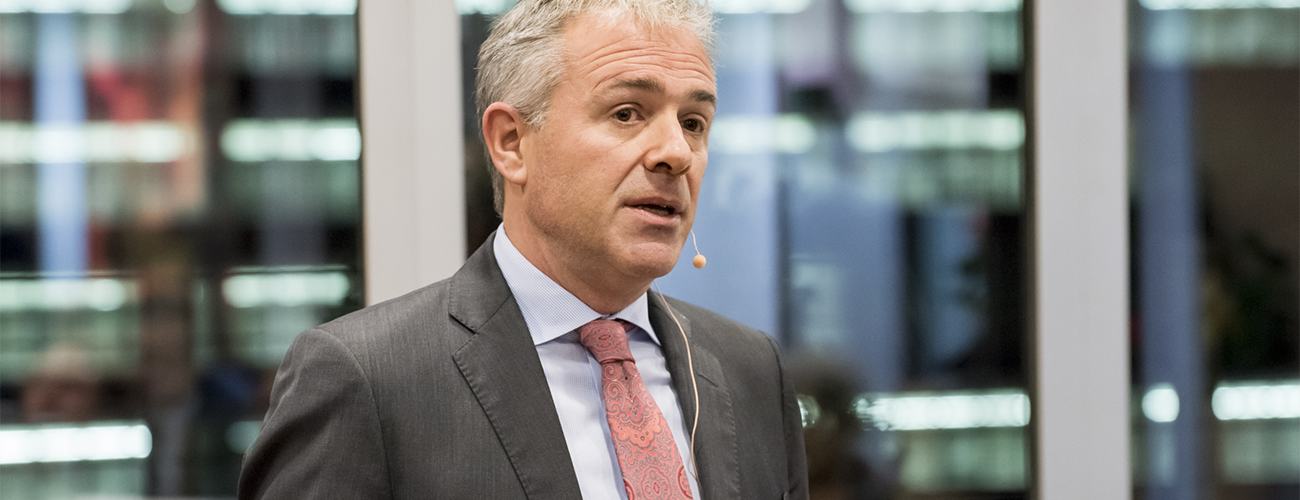Edward Luce, chief Washington columnist for the Financial Times and author of The Retreat of Western Liberalism, gave a bracing talk on the fragility of liberal democracy in the 21st century to a large IPI Distinguished Author Series audience on November 8th.
He noted that the world now has 25 fewer democracies than it did in the year 2000 and that more authoritarian forms of government were proving increasingly alluring to Western populations.
He reminded listeners of Francis Fukuyama’s post-cold war “end of history” theory that posited the universalization of Western liberal democracy across the world as the final form of human government. He said the theory had been undone by three “massive geopolitical windfalls for China.”
The first of these was the discrediting of the democracy brand by the illiberal steps the West took in the aftermath of 9/11 like restrictions on rights, the opening of Guantanamo, and the invasion under false pretenses of Iraq. Following this, he said, came the failure of democracy to take hold in the Arab Spring uprisings across the Middle East and North Africa.
Second came the 2008 financial collapse, which he said was wrongly called a global recession. “It was an Atlantic recession; China was still growing,” he said. He argued that China with its double digit growth rates used this period to “burnish its authoritarian model of political economy and development” and promoted it successfully in Africa and Central Asia at the expense of Western influence.
The third was the election of Donald Trump and how it played in China. “Whether it’s the fringe bloggers or accepted critical think tanks in Beijing, they have had the legs cut out from under them because the entire basis of their argument was that if you give people the choice, people will generally choose wisely,” he said. “That has been destroyed by Trump’s victory.”
He said he was dismayed by the rise of populism and the decline of established political parties both in Europe and the United States. “Each country has a different narrative, but the idea of the countries of the West working in unison collectively has been severely disabled by this, and the values that underpin Pax Americana have decayed.”
He said the secret of the success of Pax Americana was the supportive network of American alliances that were set up but are now lapsing. “The value of alliances is no longer held high so we are living in a very different period where others are rising,” he said, “and we don’t really know how to deal with the dilution of our power.”
He noted that in the year 2000, 31% of Americans said they were lower class, but that by 2015, the figure had risen to 49%. “That’s an extraordinary number, particularly in America,” he said.
This perception of diminished self-worth combined with the absence of a national commons – a public space where ideas can be debated civilly and warnings can be responsibly sounded– have produced an atmosphere of national stasis, he said.
“The problems we are facing today are not like Pearl Harbor or Sputnik – unifying shocks that sort of galvanize bipartisan action and stir the system into decision,” he said. “They’re very polarizing, fragmenting, quite subtle, overlapping trends, interacting challenges that are disabling our politics, and are making it extremely difficult for any kind of consensus building to take place. And I believe that it is getting worse, not better.”
IPI Senior Adviser Warren Hoge, moderating the conversation, asked if this void in world leadership left by the West’s retreat would be filled by a resurgent China. “Actually, my fear is not that China will replace the West” he responded, “but that chaos will.”
Asked by several members of the audience why he had not called the book the “collapse” rather than the “retreat” of Western liberalism, he said that he still didn’t understand the phenomenon well enough to pronounce its final end.
“‘Collapse’ is too Marxist, too determinant,” he said. “We can still write the script, and the script we should write is liberal democracy.”








